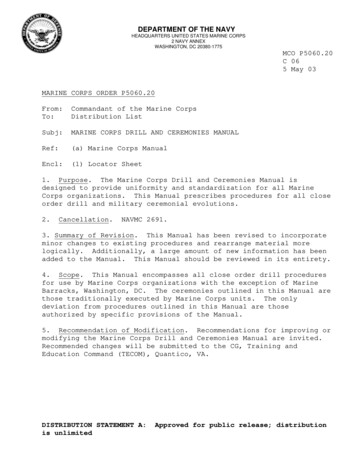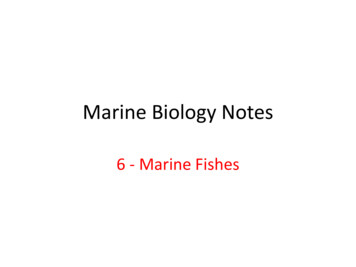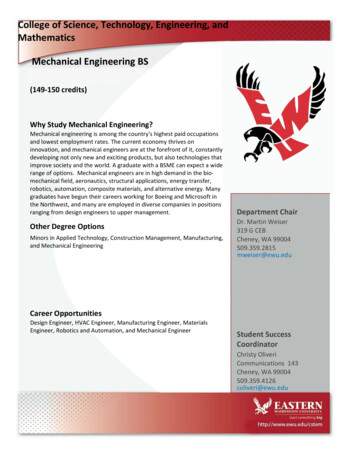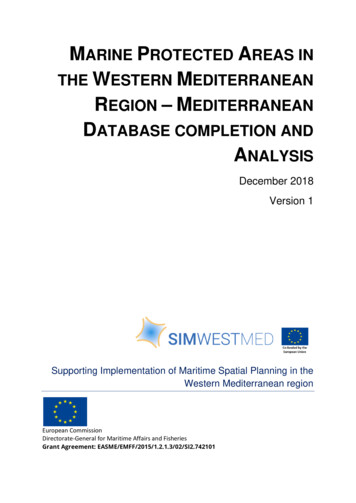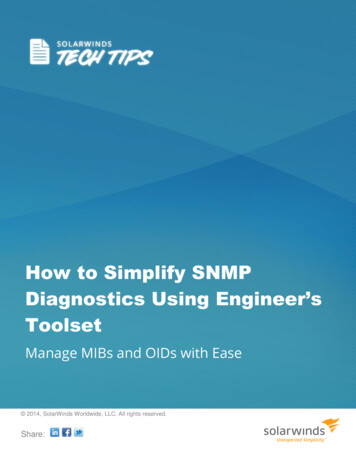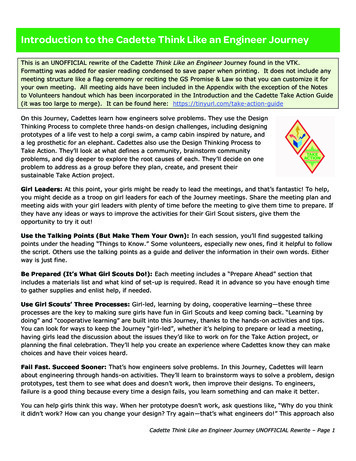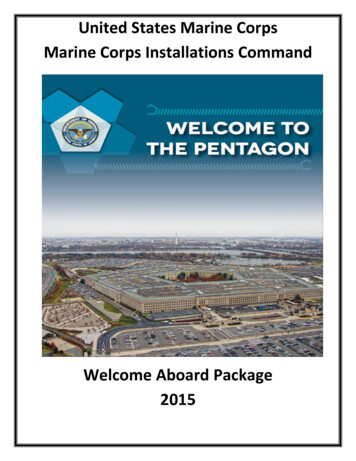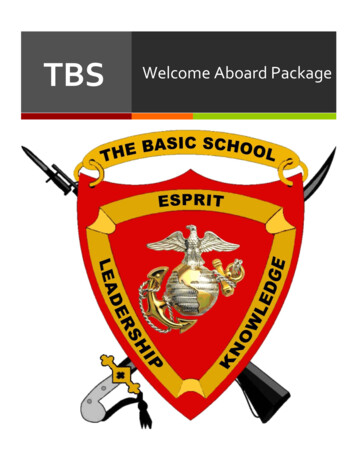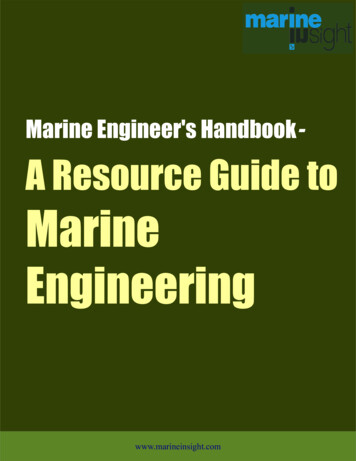
Transcription
Marine Engineer's Handbook-A Resource Guide toMarineEngineeringwww.marineinsight.com
Marine Insight A Resource Guide to Marine EngineeringPublication date: June 2013Author: Raunek KanthariaEditor : Raunek KanthariaPublished by: Marine Insight www.marineinsight.comGraphic Design: Anish Wankhede(copyright symbol) Copyright 2013 Marine InsightNOTICE OF RIGHTSAll rights reserved. No part of this book may be rewritten, reproduced,stored in a retrieval system, transmitted or distributed in any form ormeans, without prior written permission of the publisher.NOTICE OF LIABILITYThe authors and editors have made every effort possible to ensure theaccuracy of the information provided in the book. Neither the authorsand Marine Insight, nor editors or distributors, will be held liable for anydamages caused either directly or indirectly by the instructionscontained in this book, or the equipment, tools, or methods describedherein.Our Other Free eBooksGet All the Freee-Books by Subscribingto Marine Insight here
CONTENT1. Marine Engineering vs. Nautical Science2. Engine vs. Deck Department3. How to Become Marine Engineer ?4. Hierarchy in Engine Department5. Important Documents for Marine Engineers6. Important Courses for Marine Engineers7. Important Books for Marine Engineers8. Further Studies for Marine Engineers9. Marine Engineering Resources
Marine Engineering Vs Nautical ScienceIn order to have a successful career at sea,it is important you make the right decisionsat the start.Degrees in nautical science or marineengineering are two ways in which one canget a job on ships.However, choosing between engine anddeck departments is one such decision thatoften bothers students.There have been several cases whereinstudents have taken up deck or engine sidejust to realize later that they are moreinclined towards something else.It is therefore extremely important that oneknows in advance what field they are goingto pursue and what job they would be doinglater on ships.So what is the difference between nauticalscience and marine engineering? How wouldyou know which one to choose and what toexpect from each?1Difference between MarineEngineering and NauticalScience DegreesMarine EngineeringMarine engineering is a field that deals withthe engineering aspect of the maritimeindustry. Like any conventional engineeringcourse, marine engineering is a four yearcourse which prepares an individual tobecome an engineer on ships.Marine engineering is all about machinery onships, boats, yachts, or any sea goingvessel. There are several other technicalstreams that sprout out from this field.The curriculum of the course focuses onteaching specialized knowledge of boththeoretical and practical marine andmechanical engineering. Greater importanceis given to impart skills and competenciesthat are required to operate and maintainmachinery on board ships.www.marineinsight.com
The subjects taught in the first and secondyear of the course are almost the same asthose taught in conventional mechanicalengineering.The main aim is to introduce engineeringsciences to the students and make themunderstand the applications of thosesciences in various aspects of marineengineering.The third and fourth years are totallydedicated at imparting marine technicalknowledge. Both theoretical and practicalaspects of marine machinery are coveredwith special focus on ship’s operation andmaintenance of marine machinery.Practical knowledge through laboratory andworkshop training is provided throughout thefour years of the program, so that studentsget hands-on knowledge of dismantling andmaintenance of machines on ships.Nautical science imparts nautical technologyknowledge which is important to become adeck officer on board ships.Theoretical and practical knowledgerequired for navigation, cargo operation, shipmaintenance and operation is impartedduring the three years course, along withexposure to some areas of humanities andsocial sciences.Hands-on training is extremely important asa deck officer and thus detailed procedureand maintenance techniques of importantdeck machinery is an integral part of thiscourse.Emphasis is also given on providingspecialized knowledge on subjects such asseamanship and working in marineenvironment.MERCHANT NAVYNautical ScienceWhile marine engineering makes anindividual a ship’s engineer, nautical scienceprepares a person to become a deck officer.Nautical science is a three years courseafter which the student joins a ship astrainee ntEngineDepartmentAfter completing sufficient time at the seaand clearing required competency exams,promotion is granted considering pastperformance.2www.marineinsight.com
Engine Vs Deck DepartmentPeople planning to join Merchant Navy oftenask what is better – engine department orthe deck department? Though there is nospecific answer to this question,understanding important aspects of both thesides is very important.Before deciding between engine and deckdepartments, we ask students to keep thesefive things in mind before joining merchantnavy.Then for anyone who is confused betweenengine side and deck side, it is importantthat he or she first understands thedifference between Nautical Science andMarine engineering. (People who studynautical science become deck officers andthose who study marine engineeringbecome marine engineers).Knowing about various subjects one has tolearn in each of these streams helps to getrid of most of the doubts involved withdeciding between the two departments.3A career in merchant navy is unlike any othercareer and every person planning a career inthe same would know about it.In case you don’t, read them here -Reasonsas to why a career in merchant navy is unlikeany other.People confused between engine and decksides, often have queries regarding thefollowing aspects:Salary structureJob profileFuture prospectsPlacement and jobavailabilityAvailability of shore jobswww.marineinsight.com
Let’s look at each aspect individually.Salary structureSalary structure of both engine and deckdepartments is almost the same. Thismeans that officers at corresponding rank inboth the departments earn almost equally.The article on average range of salaries ofofficers on ships would help to resolve thedoubt.Job profileThough the job profile and nature of dutiesof officers in both the department aredifferent, at the end it an individual’s choiceas to what side to choose.Work profile in both engine and deckdepartments is challenging and rewarding.It’s the person’s prerogative to decidebetween engine side and navigation side.Future prospectsA ship cannot run without engine officersand deck officers. Thus the need of both thetype of officers will always be there (Unlessthey come up with totally unmanned ships).Both the sides have bright and respectablefutures.Placement and job marketThis is one aspect which bothers the mostespecially to those who are just entering thefield. Though there are several reasonsbecause of which deck cadets and juniormarine engineers are not getting jobs, thesituation is expected to improve soon.4However, it is to note that employmentproblems are prominent in every field at thestarting level and it’s the same withmerchant navy as well. Officers of higherranks from both engine and deckdepartments are always in demand.Onshore opportunitiesFor those who also consider on shore jobprospects must note that there are severalopportunities on shore of merchant navyofficers.Experienced marine engineers and deckofficers can get jobs in the managementdepartment of shipping companies.Marine engineers can take up shore basedjobs as Design, Seismic, and MaintenanceEngineers. They can also take up the job oftrainee surveyors. Nautical officers as wellas marine engineers are also required inChartering / Ship Brokerage firms.However it is advisable to sail for certainyears and take good amount of experiencebefore shifting to shore jobs.Those who areinterested in future studies can do an MBA inShipping and improve their job options onshore. Read more here – How to do MBA inShipping?Thus, a career in both engine and deckdepartment is a rewarding and challengingone. At the end, it is up to the individual todecide what he or she is more passionateand interested about.www.marineinsight.com
How to become Marine Engineer?Marine engineering is a job that is very muchsought after around the world. The growth ofthe industry and the continued research anddevelopment in the field has rubbed off onthe academic study of this engineering fieldand more people have started to opt for it.The length of the graduate course ofengineering may vary slightly in somecountries, but in general it is 4 years, whereinthe student undergoes comprehensivetraining in both theoretical as well aspractical aspects of the science.The increase in the commercial activities,across the seas also has a positive impacton marine engineering with unprecedentedrise in the number of merchant navy vesselsand trading. All these have had a positiveimpact on the job market in this dynamicsector. Certain attributes are pre-requisitefor any job in the merchant navy or as amarine engineer, whereas there are otherrequired qualifications which vary fordifferent profiles.In some cases practical sessions areconducted in-house and some of thesessions are also conducted at real sites likeshipyards or real ships. The theoreticalsubjects include, apart from English, which isthe most widely understood and usedlanguage in merchant navy, computerscience, applied mathematics, physics,electronics and marine management.There are colleges that offer both degreeand post graduate courses in marineengineering. For someone who hasambitions of becoming a marine engineer,this is supposed to be the first base. Theeligibility, required to take an admission inthese courses is pretty much the samearound the world.5Besides these there are several othersubjects that are covered and students areeducated regarding environmental science,maritime commerce, control systems etc.These trainings are necessary for anyoneaspiring to be a marine engineer or whowants a job in the merchant navy as it notonly adds to the mental abilities but alsoinculcates physical attributes.For better prospects in the existing job orwww.marineinsight.com
the open job market, a masters degree inmarine engineering is definitely advisable.The training albeit enhanced is not thatdifficult, especially for a graduate student ofthe same discipline as it comprises mostly oflab hours that put into practice the variousprinciples of engineering studied previously.get an additional degree in marine and opennew doors of opportunities.A one year Graduate Marine Engineering(GME) course after mechanical engineeringwould give students the license to entermerchant navy. This one year GME course isall you need to become a marine engineerafter doing mechanical engineering.Creating a portfolio helps anybody trying toclimb the hierarchy of seniority in themerchant navy. In any case, the mostsuccessful in this field are definitely the oneswho had a clear idea of what they wantedout of this industry and which of theircharacteristics suited it the best.Eligibility CriteriaHowever, there are certain requirementswhich one should satisfy in order to join theone year marine engineering course. Theyare as follows: Graduation in BE (Mechanical)Engineering / Naval Architecture withminimum marks of 50% in final year Must have minimum 50% marks inEnglish language at 10th or 12th or inDegree Exam Must not be more than 28 years oldand should satisfy all healthrequirements that are necessary tojoin the merchant navy.With the recent studies predicting a steadygrowth in the international trade, this industryis more or less set to keep on progressing.This is because ‘shipping’ is still the easiestand cheapest mode of transportationaround the world. Therefore the profile of amarine engineer would remain a center ofattraction for the youth for a long time tocome.If you are a mechanical engineer and wish toget a job in the merchant navy, then you cando so by becoming a marine engineer usingyour mechanical engineering degree. Findout how to do marine engineering aftermechanical engineering here. To know more about the medical healthrequirements, read Physical Fitness andMedical Requirements to Join Merchantnavy.Mechanical and marine engineering courseshave several subjects in common and thismakes it easier for a mechanical engineer to6www.marineinsight.com
Hierarchy Level in Engine DepartmentThe nomenclature of merchant navy rankingsystem is universally accepted by shippingcompanies and commercial vessels aroundthe world. However, there can be minorchanges in names and duties assigned tospecific positions depending on the countryto which the ship belongs.The Engine Department Chief EngineerSecond Engineer/First AssistantEngineerThird Engineer/ Second AssistantEngineerFourth Engineer/ Third AssistantEngineerFifth Engineer/ Engine CadetEngine Room RatingFitterMotormanWiperTrainee Fitter / Trainee WiperChief Engineer: Chief engineer is thehead of the engineering department on avessel. The required qualification for this7position is loosely referred to as the “Chief’sTicket”. Alternatively, he can also be termedas the “The Chief” and usually draws thesame payment as the Captain, although thecomplete responsibility of a particular vesselfalls solely on the Captain’s shoulder.The Chief Engineer cannot take over theship’s charge, unless such a situation ariseswhich has been documented under thesafety measures.Chief engineer gives orders for operationand maintenance of ship’s machinerysystem and is responsible for the entireengine room department.Second Engineer/ First AssistantEngineer: He is associated with the dayto-day activities in the engine room, and isaccountable to the Chief Engineer.He stays extremely busy most of the time onboard, as he needs to constantly supervisethe proper functioning of all engine roommachinery systems and also assigns jobs tothe other engine officers and crew. Thewww.marineinsight.com
Second Engineer generally keeps watch onthe engine room, during the day time.always remains in working conditions. Heassists the watch keeping officer.Third engineer/ Second AssistantEngineer: This is the next position afterWiper:the Second Engineer, and is assigned jobs tolook after machinery ordered by the chiefengineer, along with carrying out daily watchkeeping. He reports to the second engineer.Fourth Engineer/ Third AssistantEngineer: This is the lowermostoperational rank in the engineeringdepartment. The Fourth Engineer isconcerned with the correct working of themachinery systems assigned to him and alsocarry our watch keeping. He reports to thesecond engineer.Wiper looks after the cleaning andpainting job in the engine room and alsodoes house keeping jobs.Trainee wiper/ fitter:Trainee wiper aresent onboard for training purpose as per therank appointed and will be assisting wiper orfitter in the daily routines.All the engine room ratings report to thesecond engineer.Chief EngineerSecond EngineerFifth Engineer/ Engineering Cadet:Fifth engineer is a trainee under the SecondEngineer officer, and he assists and learnswhile observing and carrying out activities inthe engine room. He would accompany asenior officer (mostly second engineer)during the watch duty.Third EngineerEngine FitterFourth EngineerMotorman/OilerJr. EngineerWiperEngine CadetTrainee Wiper/FitterEngine Fitter: The engine fitter isresponsible for doing maintenance of all pipeand fitting jobs including welding, cutting andother workshop operation as instructed bythe engine room in-charge.Oiler/ Motorman: Being a motormanwould need you to remain on your alert bestto make sure that the overall machinery8www.marineinsight.com
Important Documents for Marine EngineersFor those young engineers who don’t haveany immediate association with theMerchant Navy field, the time aftergraduation from a maritime academy can berather confusing.Also, in the quest for seeking employment,Engine cadets often forget to get theirimportant documentations ready. It istherefore important that junior engineer donot ignore the necessity to keep alldocumentations ready, in order that theymay produce them to the employerwhenever required.Also, prior to seeking employment, duringthe visits to Mercantile Marine Department(MMD) to get a variety of work done, thesedocuments must be kept assorted in folderat all times.CDC (Continuous DischargeCertificate): Perhaps the most importantthing for a seafarer, this booklet must bekept handy at all times. The CDC number is9always required when filling out applicationforms for a job, to do maritime courses, forendorsement etc.INDoS (Indian Database ofSeafarers): Another important documentthat must be carried at all times. Read moreabout INDos number here. Every country hastheir own system of maritime database andfresh marine engineers must apply for theirnumber as soon as possible.STCW (Standards of Training,Certification and Watch keeping)Certificates: The mandatory STCWcertificates comprising of PST (PersonalSurvival Techniques), PSSR (Personal Safetyand Social Responsibility), EFA (ElementaryFirst Aid), FPFF (Fire Prevention and FireFighting). All these are mandatory courseswhich are to be carried out by sea goingprofessionals.Passport: The ultimate proof of identity forseafarers apart from CDC. Seafarers arewww.marineinsight.com
advised to keep passport always with themwhen getting documentation related workdone. Junior engineers must carry thiseverywhere.Photographs: It is always necessary tocarry a few extra copies of passport sizedphotographs while going for documentation.Course Completion Certificate: Theproof of having completed the tenure ofstudy at college. A certificate ofdegree/diploma is required for alldocumentation processes.Xth/XIIth mark sheet: These may berequired for proof of age and to verify otherimportant details.As mentioned earlier, a few visits to theMMD is required to get a variety ofnecessary work done. Following are theprocedures to be completed before settingsail for which, the above mentioneddocuments shall be required:1.Yellow Fever Vaccination: This vaccinationis required for individuals traveling to SouthAmerican and African countries. The shotcan be obtained from the MMD (MercantileMarine Department) for a fee of INR 300/(Will vary according to the country).For this, documents required arephotocopies of front and back pages of theCDC and Passport. Prior booking for thevaccination has to be done from the office10of the Port Health Officer. The vaccinationis valid for 10 years. This can be obtainedeven without an offer letter from a company.2. Engine room simulator certificates: Thesimulator training certificate is anotherrequirement for applying to class 4 or class2 level examinations.3. OTF/GTF/CTF: Depending on the vesselthe cadet will be sailing on, the respectivecourse needs to be done for the particulartype of vessel (Oil/Gas/Chemical).Always check for DG approval status on thewebsite (www.dgshipping.com) beforechoosing the course at an institute.4. Dangerous Cargo Endorsement (DCE):The OTF/GTF/CTF certificate completedcan be rendered invalid if it is not endorsedat the MMD.Depending on the type of ship the MarineEngineer will be sailing on, the necessarycertificate (OTF/GTF/CTF) should beendorsed for a fee.Remember to include each and everydocument mentioned in the DCE checklist.The medical certificate is a bit tricky so it isadvised to go through the exact tests andcheckups required for the medical certificateto be considered appropriate.www.marineinsight.com
Important Courses for Marine EngineersMarine engineers have to do a number ofmandatory certification courses before theyget on the ship. They are as follows:These courses are to be undertaken atinstitutes/courses providers certified by thecountry’s shipping authority.1. STCW Courses2. Operational Level Engine roomsimulator course (for 4th and 3rdengineers)The Standards of Training, Certification, andWatch-Keeping (STCW) Courses forSeafarers are to be done by all marineengineers. STCW courses include:EFA – Elementary First AidMFA – Medical First AidBFF – Basic Fire FightingAFF – Advanced Fire FightingPSCRB – Proficiency in Survival Craft andRescue BoatPST – Personal Survival Techniques3. Management level engine roomsimulator course (for 2nd and chiefengineers)4. CFT/ OTF / GTF – Container/Oiltanker/ Gas tanker familiarizationcourses depending on the type ofship5. Certificate of Competency(COC) CoursePSSR – Personal Safety and SocialResponsibility11www.marineinsight.com
Important Marine Engineering BooksMarine engineering is a specialized subject,which requires equally specialized books tolearn and understand the concepts. Marineengineers, both students and sea-goingprofessionals, have to continuously keepthemselves abreast with the changingtechnologies and policies in the maritimefield.Though there are several books out there tolearn about marine engineering and itssubjects, there are a few that are extremelycomprehensive and useful for marinersaround the world.We have handpicked some of the bestmarine engineering books, which should bethere in the collection of every marineengineer.Introduction to Marine Engineering– D.A. TaylorOne of the finest and most read books onmarine engineering, Introduction to marineengineering by D.A. Taylor providesinformation on every aspect of the ship’smachinery systems. An extremely valuable12guide for maritime professionals, this is a“must-have” book for those studying marineengineering or preparing for competencyexams.General Engineering Knowledge(Marine Engineering) – H.DMcGeorgeGeneral Engineering Knowledge by H.DMcGeorge is the perfect text book for thoseseeking a one-stop resource for marineengineering subjects. Though it doesn’tprovide in-depth insights in the working of allmachinery, the book is quite useful forgetting a general overview of all theimportant points of every machine on ship.Marine Auxiliary Machinery – H.DMcGeorgeYet another masterpiece by H.D McGeorge,the Marine Auxiliary Machinery is a highlyrespected book for both students and seagoing marine engineers. This book is theultimate guide for marine auxiliary machineryand provides comprehensive information onoperation, care, and maintenance of ship’smachinery and apparatus.www.marineinsight.com
Lamb’s Question and Answers onMarine Diesel Engines – S.ChristensenLamb’s Question and Answers on MarineDiesel Engines is a one-stop resource forknowledge on marine engines. From themost basic concepts to the most advancedprinciples, this book covers everything in aneasy-to-understand format. Without doubt,the Lamb’s book on Marine Diesel Engines isthe best book in the market forunderstanding marine engines.Pounder’s Marine Diesel Enginesand Gas Turbines – DougWoodyardPounder’s Marine Diesel Engines and GasTurbines is one of the oldest books onmarine diesel engines and gas turbines.Now in its ninth edition, the book hasextensively helped both students and seagoing engineers to understand technologyand concepts behind marine diesel enginesand gas turbines.Marine Electrical Equipment andPractice – H.D McGeorgeAn important book in the H.D McGeorge’smarine engineering series of text books, theMarine Electrical Equipment and Practice byH.D McGeorge is an important book formarine engineers who seek to understandship’s electrical equipment and operatingprinciples.13Marine Boilers –G.T.H FlanaganAn extremely comprehensive and importantbook on marine boilers used on ships, thisbook on marine boilers provides informationon boilers and associated equipment asused at sea. A must-have book for all marineengineers appearing for competency exams,it covers every aspect of marine boilers andits types used on ships.Reed’s Basic Electrotechnology –Marine Engineering SeriesReed’s sixth volume of marine engineeringseries deals with electrotechnology andelectrical engineering principles of the ship.A step-by-step solution of a variety ofelectrical systems is provided in an easy tounderstand format. This book should be withevery marine engineer going to the sea.Practical Marine ElectricalKnowledge – Dennis T. HallPractical marine electrical knowledge is afamous book by Dennis T. Hall. The bookprovides knowledge of the ship’s electricalsystem, including the generation plant,switchboards, and distribution network. Italso focuses on electrical safety and safeworking practices required on the ship.Ship Construction – David J. EyreShip construction by David J. Eyres is acomprehensive book on shipbuilding andshipyard practices for marine engineers andnaval architects. It also provides latestdevelopments in the construction ofwww.marineinsight.com
different types of ships and safety practices.This is an essential book for both maritimestudents and professionals working in thefield of ship construction and maintenance.More Recommended Books forMarine EngineersReed’s Marine Engineering Series,Vol. 8 – General Engineering Knowledgefor Marine EngineersDiesel Engines – SanyalGet the Complete List of Marine EngineeringBooks Here.Additional important books formarine engineersTop 6 Books on Marine Auxiliary MachineryTop 6 Books on Marine Boilers12 Important Books Every Seafarer MustHaveReeds Marine Engineering Series,Vol. 12 – Motor Engineering Knowledge forMarine EngineersIntroduction to Naval Architecture,Fourth Edition – E.C. TupperNotes on Instrumentation andControl (Marine Engineering Series)– G.J. RoyReed’s Instrumentation and ControlSystems, 4th Edition – MarineEngineering SeriesThe Running and Maintenance ofMarine Machinery – CowleyPrinciples and Practice of Marine114www.marineinsight.com
Further Sudies for Marine EngineersFor some people one education degree isnever enough. These are people who craveof knowledge, irrespective of the field theyare in.If you have a degree in marineengineering/naval technology and are one ofthose who want to study further aftersecuring a degree in merchant navy, thenread on.15Post Graduation Courses It is not necessary that after obtaining adegree in marine engineering one has toforcibly go on ships. If you have the patience and are willing tostudy further, there are several opportunitieson shore which are equally lucrative. However, kindly note that not all postgraduation courses would facilitate you witha land job, but yes, most of them would. Following is a list of post graduation coursesthat can be done after a bachelor degree inmarine engineering/ naval technology. MSc marine engineeringPost Graduate Diploma in MarineEngineeringMSc Coastal and Marine Engineeringand ManagementMSc Marine Studies and CostalResourceManagement and Higher NationalDiploma in Marine EngineeringNaval Architecture and marinesciencesNaval Architecture and oceanengineeringMarine draftingOcean engineeringNaval Architecture and Ship buildingCoastal engineering and managementMasters in Shipping and TransportMarine Transport designMSc Technical management of shipoperationMSc Subsea engineeringMSc in Offshore Floating SystemsMSc Marine and Offshore Powerwww.marineinsight.com
SystemsOffshore and EnvironmentalTechnologyPipeline engineeringSubsea Engineering and ManagementSustainable energy technologies(marine)Submarine design and technologyMaritime operations and managementPG Diploma in Internationaltransportation and LogisticsPort ManagementMSc Remote Operated Vehicle (ROV)System and DesignShip and offshore StructureMSc Marine SciencesMSc Marine ZoologyMSc (Marine Sc.) specialization inMarinebiology, Marine geology, Marinegeophysics,Chemical oceanography, PhysicalOceanography, M.Sc. (Meteorology &Oceanography)MSc Marine geologyMSc Ocean Life SciencesMSc in Marine bio. OceanographyMBA in ShippingMSc in marine biologyMaritime LawMarine Engineering(BE/ B.Tech/ ceMaritime Industry provides a myriad ofopportunities for those who want to exploredifferent areas of the marine world. A postgraduation in any of the above mentionedcourses would open doors to a range of newopportunities in the maritime field itself.16www.marineinsight.com
Marine Engineering ResourcesThe maritime industry is a rapidly changingone and marine engineering is an integralpart of it. Marine engineers working in theindustry have to keep themselves abreastwith the latest developments andregulations.Needless to say, in a field like marineengineering, the process of updating oneselfis a continuous one and there is a lot tolearn.Coming to marine engineer’s main job, whichrequire them to operate and maintain ship’smachinery, learning the basics of marineengineering is as much important asunderstanding advanced concepts of ship’sengine room through experience andpractical knowledge.This marine engineering tutorial will guideyou through all the important machinerysystems of ships and their working.Main EngineThe propulsion engine or the main engine is17what drives the ship. The biggest machine inthe engine room, the main propulsion enginemakes a major part of marine engineeringlearning.8 Engine Terms Every Marine EngineerShould Know – Part 18 Engine Terms Every Marine EngineerShould Know – Part 2Troubleshooting: Excessive Loss of Waterfrom Main Engine Fresh Water ExpansionTankHow to Use Main Engine Performance Curvefor Economical Fuel Consumption on Ships?The Essential Marine Engine MaintenanceGuide For Marine EngineersHow Spark Erosion Can Damage the MainPropulsion Engine of a Ship?Understanding Diesel Engine PerformanceHow Massive Main Engines are Fitted in theShip’s Engine Room?www.marineinsight.com
Wartsila v/s MAN Marine Engines- Who’sGot the Edge?How Marine Propulsion Engine of the Ship isProtected?How Variable Geometry Turbocharger forMarine Engines Works?Main Engine Liner Remov
Our Other Free eBooks Get All the Free e-Books by Subscribing to Marine Insight here. 1. Marine Engineering vs. Nautical Science 2. Engine vs. Deck Department 3. How to Become Marine Engineer ? 4. Hierarchy in Engine Department 5. Important Documents for M
